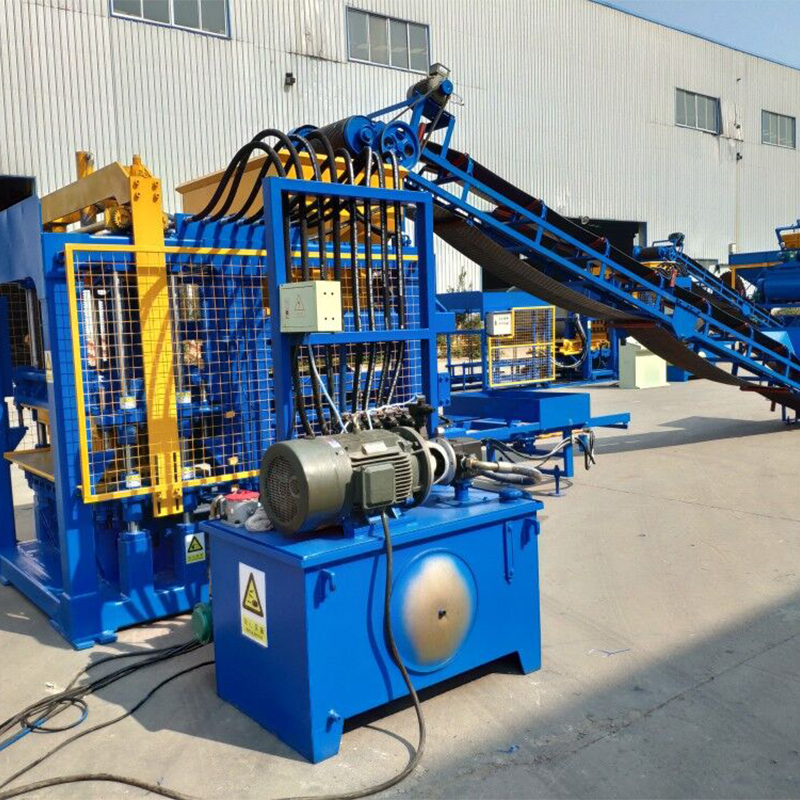
Image source Aiweibrickmachine
Strategies for Reducing Full-Automatic Block Production Waste
Title: Sustainable Excellence: Strategies for Minimizing Waste in Full-Automatic Block Production
Introduction
In the pursuit of sustainable and environmentally responsible manufacturing, minimizing waste is a crucial objective for full-automatic block production. Adopting strategies to reduce waste not only aligns with ecological goals but also enhances operational efficiency and cost-effectiveness. This article explores innovative strategies to minimize waste in full-automatic block manufacturing, addressing both material waste and process inefficiencies.
1. **Precision in Raw Material Handling**
Achieving precision in raw material handling is fundamental to waste reduction. Implement automated systems for precisely measuring and dispensing raw materials in the production process. Accurate batching and mixing minimize material overuse, ensuring that the right amount of material is utilized for each block produced. This precision not only reduces waste but also contributes to the consistent quality of the final product.
2. **Optimized Block Design for Material Efficiency**
Collaborate with design and engineering teams to optimize block designs for material efficiency. Utilize advanced design software to create structures that maximize the use of materials, reducing the amount of waste generated during production. By strategically designing blocks with minimal excess material and efficient configurations, manufacturers can significantly decrease both raw material consumption and waste generation.
3. **Closed-Loop Recycling Systems**
Integrate closed-loop recycling systems into full-automatic block production processes. These systems allow for the recycling of waste materials generated during production, creating a sustainable loop where scrap materials are reintroduced into the manufacturing process. This not only minimizes waste sent to landfills but also conserves resources by reusing materials that would otherwise be discarded.
4. **Lean Manufacturing Principles**
Apply lean manufacturing principles to identify and eliminate waste throughout the production process. Conduct value stream mapping to analyze the flow of materials and processes, identifying non-value-added steps and areas of inefficiency. By streamlining workflows and eliminating unnecessary steps, manufacturers can enhance efficiency and reduce both material and time wastage.
5. **Real-Time Process Monitoring**
Implement real-time process monitoring using sensors and automation to detect and address issues promptly. Monitoring the production process in real-time allows for early identification of anomalies, preventing the production of defective blocks. By minimizing the production of faulty or substandard blocks, waste is reduced, and the overall quality of the manufacturing process is improved.
6. **Efficient Water Usage**
Water is a vital component in the production of concrete blocks. Implement efficient water management practices to minimize water waste. Utilize closed-loop water recycling systems to capture and treat water used in the production process, reducing the overall consumption of fresh water. Additionally, optimize the curing process to minimize water usage while ensuring the quality and strength of the blocks.
7. **Packaging Optimization**
Address waste in the packaging stage by optimizing packaging materials and processes. Utilize packaging designs that minimize excess material while ensuring the protection and stability of the blocks during transportation. Consider eco-friendly packaging options, such as recyclable or biodegradable materials, to further reduce the environmental impact of packaging waste.
8. **Employee Training and Engagement**
Invest in employee training and engagement programs to raise awareness about the importance of waste reduction. Empower employees to identify and suggest improvements in the production process that can lead to waste reduction. By fostering a culture of environmental responsibility and continuous improvement, manufacturers can tap into the collective knowledge and expertise of their workforce.
9. **Energy-Efficient Manufacturing Practices**
Adopt energy-efficient manufacturing practices to reduce the overall environmental impact of production. Implement technologies such as energy-efficient machinery, LED lighting, and smart controls to optimize energy consumption. Energy efficiency not only aligns with sustainability goals but also contributes to cost savings, making it a win-win strategy for both the environment and the bottom line.
10. **Life Cycle Assessment (LCA) Analysis**
Conduct Life Cycle Assessment (LCA) analyses to evaluate the environmental impact of the entire block production process. Identify hotspots where waste is generated or resource consumption is high. This holistic approach provides insights into the entire life cycle of the product, allowing manufacturers to implement targeted strategies for waste reduction and sustainability improvements.
Conclusion
Minimizing waste in full-automatic block production is a multifaceted endeavor that requires a combination of technological advancements, process optimization, and a commitment to sustainability. By implementing precision in raw material handling, optimizing block design, integrating closed-loop recycling systems, and embracing lean manufacturing principles, manufacturers can significantly reduce waste and contribute to a more sustainable and efficient production process. As the industry continues to evolve, waste reduction strategies will play a pivotal role in shaping a greener and more responsible future for full-automatic block manufacturing.
